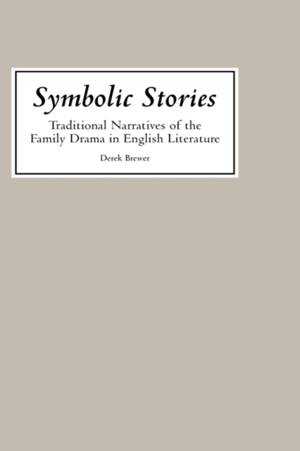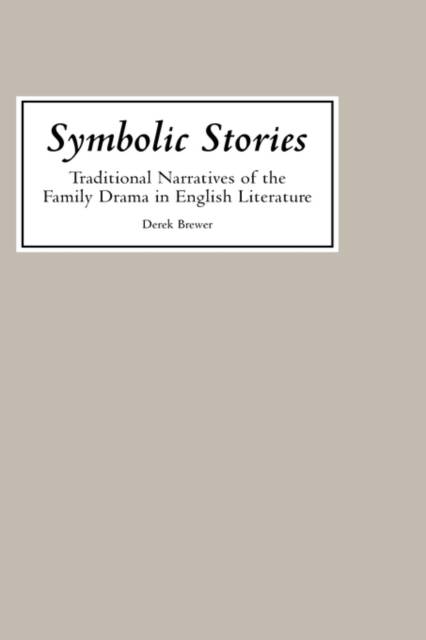
- Afhalen na 1 uur in een winkel met voorraad
- Gratis thuislevering in België vanaf € 30
- Ruim aanbod met 7 miljoen producten
- Afhalen na 1 uur in een winkel met voorraad
- Gratis thuislevering in België vanaf € 30
- Ruim aanbod met 7 miljoen producten
Zoeken
Symbolic Stories: Traditional Narratives of the Family Drama in English Literature
Derek S Brewer
Hardcover | Engels
€ 177,45
+ 354 punten
Omschrijving
Many famous stories from the Old Testament, medieval romance and folktale, to Shakespeare's tragedies and comedies and even some great novels present apparent inconsistencies of absurdities when judged as plausible representations of 'reality'. Yet the experience of many generations of readers and listeners is that such stories take a powerful hold on the imagination and memory, and create a strong impression of coherent significance. 'Symbolic Stories' shows why the structure of these tales is so significant, and why they are repeated, both in the original and variations, down the ages. Dr Brewer reveals new aspects of the stories themselves by elucidating the implicit and smbolic meanings that lie below the literal narrative. The stories discussed are those that are especially concerned with the processes of growing up and coming to maturity. They are told from the point of view of the emerging individual as he or she passes through the 'rites de passage' that allow disengagement from parents, self-realisation, the establishment of new relationships, and integration with society. The book demonstrates certain characteristic themes and structures in these traditional stories, but is far from reducing them to a single formula. One of the main purposes is to show how selected stories of great artistic value establish their own individual meanings within the general pattern. There are new interpretations of the famous romances, 'Sir Gawain and the Green Knight', and Malory's 'Tale of Sir Gareth', and of other romances. Shakespear'es remarkable portrayels throughout his career of various aspects of the family drama are discussed, and the essence of a new theory of tragedy and comedy is suggested. The extreme type of traditional story in Europe is seen as the fairy tale, which is analysed to show how fundamentally such narrative differs from the novel, but 'Mansfield Park' and 'Great Expectations' are explored in detail to show their equivocal relationships to the tradition. The book will appeal to all those who are interested in the structure of narrative, whether from the point of view of literature, psychology or folklore. The author, Dr Derek Brewer, is Master of Emmanuel College Cambridge and Reader in Medieval English Literature in the University of Cambridge. He has published numerous books and articles, especially on Chaucer, but on all periods of English Literature.
Specificaties
Betrokkenen
- Auteur(s):
- Uitgeverij:
Inhoud
- Aantal bladzijden:
- 200
- Taal:
- Engels
Eigenschappen
- Productcode (EAN):
- 9780859910637
- Uitvoering:
- Hardcover
- Formaat:
- Genaaid
- Afmetingen:
- 156 mm x 234 mm
- Gewicht:
- 462 g

Alleen bij Standaard Boekhandel
+ 354 punten op je klantenkaart van Standaard Boekhandel
Beoordelingen
We publiceren alleen reviews die voldoen aan de voorwaarden voor reviews. Bekijk onze voorwaarden voor reviews.








